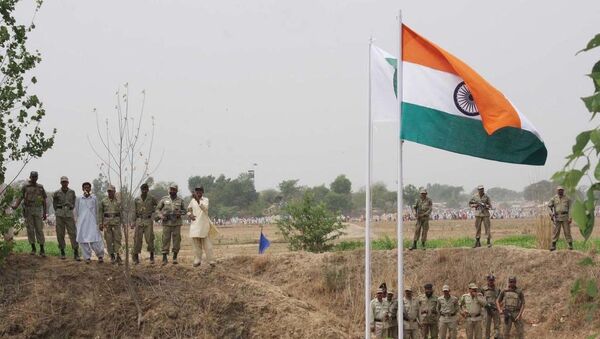Unperturbed by India and Pakistan’s diplomatic back and forth since the abrogation of Jammu and Kashmir's special status by the Indian Parliament on 5 August, people on the Indian side of the International Border interestingly continue to go about their lives as normal.
India and Pakistan share a 200-km long International Border, stretching from the Kathua to Akhnoor districts, in Jammu and Kashmir. About 100 km of the highway, connecting national capital city of New Delhi to Jammu, runs parallel to this International Border.
As Sputnik visited Lakhanpur, the first town from New Delhi to the state of Jammu and Kashmir, it found the shops located on the roadside had Indian national flags atop them. These flags were never noticed before the revocation of the state’s special status.
Jammu and Kashmir earlier used to have its separate red coloured flag with a plough and three white strips marked on it.
People in Lakhanpur said they were delighted to see a big change as the state will be federally administered. Most of the people hoped a visible development would occur due to new laws.
Though most of them said revocation is certainly a political move, some opined that with this latest move Prime Minister Narenda Modi has ensured victory for his party BJP in the coming elections.
“Modi has done very good (removal of special status) he will win the election after five years", said 25-year-old Vikram, a snack seller in Lakhanpur.
The highway, and the International Border are divided by up to 30 km at points.
Many a time this highway has been used by militants targeting military installations and civilian population for attacks. To know the real situation at the International Border, Sputnik visited the R.S. Pura sector on the International Border between India and Pakistan.
Sputnik found the general environment was normal and reflected locals going about their business as usual.
Security deployment at the Zero Line, separating India from Pakistan, looked normal. India’s Border Security Force (BSF) personnel allowed visitors and tourists to take selfies at the Zero Line on the Indian side.
Both India and Pakistan are forbidden from constructing any kind of barrier beyond 150 yards of the Zero Line.
“You can see Border Pillar 919 and 918 on either side of the barrier. This is the Zero Line. You are here in India, but if you cross that line (observation post), you land in Pakistan", a BSF trooper told Sputnik.
While a BSF trooper said the paramilitary force has directions to not disrupt farmers who till their lands near the Zero Line, farm animals continued to graze near the border check post.
Communication between Indian and Pakistani border guards has stopped since 14 February 2019, when an alleged Jaish-e-Mohammed suicide bomber killed 40 Central Reserve Police Force (CRPF) personnel in Pulwama.
“Earlier we use to exchange sweets during the Muslim festival of Eid and on Independence Day. But since 14 February, there has been no contact between the BSF and the Pakistani Rangers. They avoid us and so do we", the officer told Sputnik on condition of anonymity.
Many of the local youngsters were playing cricket on a helipad, located near the Zero Line, despite it being watched over by security personnel.
Sixteen-year-old Pankaj said they enjoy playing cricket here every Sunday. “There is no fear here. The situation is fine".
Pakistan claims India’s decision to revoke the special status of Jammu and Kashmir and alter the territorial status of the state is a direct violation of the Simla Agreement of 1972.
India, on the other hand, says the decision to revoke the region's special status is an internal matter.
The nuclear-armed neighbours have fought two of their three wars over the disputed territory since gaining independence from British colonial rule in 1947.
Citing intelligence reports, some media organisations, however, have indicated possibility of infiltration though there has been no turbulence reported on the International Border so far.




